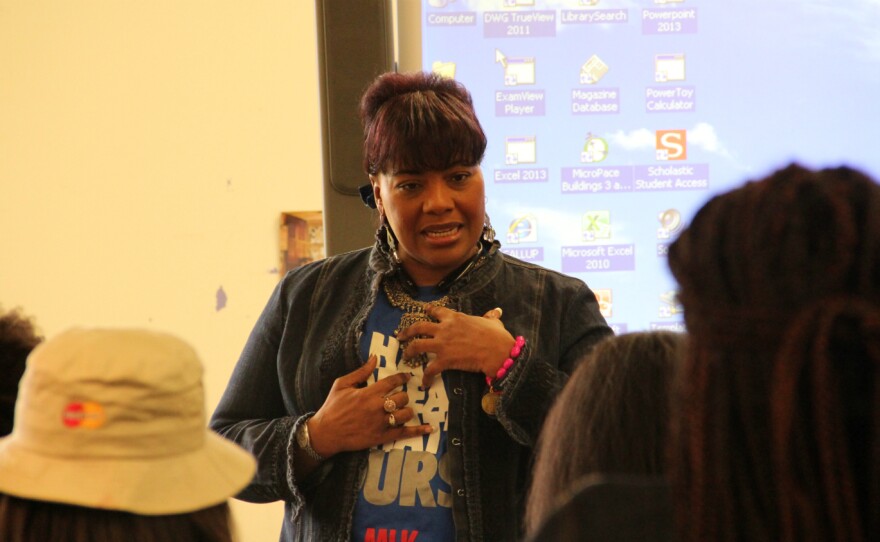
This story is a consolidated version of a three-part series by St. Louis Public Radio that profiles how issues of race and class sparked by Ferguson are being discussed in St. Louis area schools.
It was early September and Vincent Flewellen had just wrapped up his day teaching at Ladue Middle School in an affluent suburb about 13 miles south of where protests erupted in Ferguson.
Flewellen was in a good mood, but he knew he could be in for a difficult night.
Less than four weeks had passed since Ferguson Police Officer Darren Wilson fatally shot Michael Brown, sparking countless protests.
Students in Missouri were enjoying the last few days of summer vacation when the protests broke out. For some teachers around St. Louis, the events in Ferguson present a chance to teach about race in a new, more meaningful way.
According to a report by the East-West Gateway Council of Governments, the St. Louis region is the sixth most segregated metropolitan area in the country.
Flewellen, an African-American in his early 40s, was on his way to an event for teachers at Saint Louis University "to learn more about how to teach Ferguson. How to teach this whole ideal of racial understanding and racial healing," he says.
On his way to the event, Flewellen was waiting in traffic.
"A car pulls up next to me, driven by this middle aged, older white man, who then takes his hand, his right hand, and reaches it across his passenger seat in the shape of a gun," he says.
Flewellen says the man then aimed his index finger at him and cocked his thumb like the hammer of a pistol.
"Bang, bang," Flewellen says. "He does that like seven times to me. I'm just looking at him like in complete disbelief."
Frustration coursed through Flewellen's body. He thought about calling it a night.
But he didn't.
He went on with the evening as planned, spending his time with teachers who want to untangle complicated issues of race and class.
Four weeks later, Flewellen is standing in front of his multicultural studies class.
He turns to a whiteboard where the day's topic is written in big, blue letters.
"Ferguson," Flewellen tells the class, "we're going to continue with our conversations about race and racism in Ferguson."
He then asks students to pair up and talk to each other about how they think life experiences might differ between white and African-American residents.
Miriam Sokora and Alivia Brock are sitting next to each other.
"I've never thought that I would be walking down the street and get pulled over by police saying, 'What are you doing?' " Sokora says.
"As for me, I have to look around the street all the time," Brock replies. "Since I'm black, I have to walk around the street and look for police officers. Sometimes I even have to put my hands up a little bit just to show I have nothing."
"I think that's sad," Sokora says.
Flewellen says facilitating this type of conversation between his students helps him make sense of his own wounds.
"I think you either become bitter or you're determined to bring about change," he says.
But not all teachers are ready to take on issues of race and class.
"These conversations will become uncomfortable," says Brian Hutchison, an assistant professor at the University of Missouri-St. Louis.
Hutchison has been helping area schools figure out what to do when students bring up Ferguson in class.
He says some teachers just want to change the subject.
"It's a buffering mechanism, so that we don't actually have to talk about something that's difficult," he says.
But the topic isn't being ignored at Riverview Gardens High School, where about 60 teenagers took part in nonviolence training put together by the King Center.
Many students in this school live close to the shooting site.
As part of their final exercise, they formed small groups to talk about what could happen if a grand jury chooses not to charge the police officer involved.
Senior Elantra Jackson has a strong opinion.
"I'm not going to lie and say, 'Everybody's going to be like, oh, OK,' " she says. "There's going to be some damage done to the city."
To be clear, Jackson says she has no intention of taking part in any kind of violence.
But many students here think Wilson should be indicted, and facilitators ask them to plan a nonviolent response to whatever the grand jury decides.
Bernice King is Martin Luther King Jr.'s youngest daughter and has visited the area four times since the shooting. She considers each of the students in this room ambassadors for nonviolence.
"My father was angry," she says. "We call it righteous indignation. But he channeled that anger into something positive and constructive."
And as the St. Louis region awaits the grand jury's decision, administrators at the school hope that this training will help both students and the community handle whatever comes next.
Copyright 2014 KWMU-FM. To see more, visit http://www.stlpublicradio.org.






